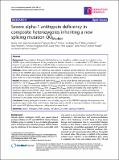Por favor, use este identificador para citar o enlazar a este item:
http://hdl.handle.net/10261/107555COMPARTIR / EXPORTAR:
 SHARE SHARE
 CORE
BASE CORE
BASE
|
|
| Visualizar otros formatos: MARC | Dublin Core | RDF | ORE | MODS | METS | DIDL | DATACITE | |

| Título: | Severe alpha-1 antitrypsin deficiency in composite heterozygotes inheriting a new splicing mutation QOMadrid |
Autor: | Lara, Beatriz; Martínez-Santiago, María Teresa CSIC ORCID; Blanco, Ignacio; Hernández-Moro, Cristina; Velasco, Eladio CSIC ORCID ; Ferrarotti, Ilaria; Rodríguez-Frías, Francisco; Pérez, Laura; Vazquez, Irene; Alonso, Javier; Posada, Manuel; Martínez-Delgado, Beatriz | Palabras clave: | Alpha-1 antitrypsin Allelic variants Null alleles QO alleles Splicing Minigenes |
Fecha de publicación: | 2014 | Editor: | BioMed Central | Citación: | Respiratory Research 15: 125 (2014) | Resumen: | [Background]: Severe Alpha-1 Antitrypsin (AAT) deficiency is a hereditary condition caused by mutations in the SERPINA1 gene, which predisposes to lung emphysema and liver disease. It is usually related to PI*Z alleles, and less frequent to rare and null (QO) alleles. Null-AAT alleles represent the end of a continuum of variants associated with profound AAT deficiency and extremely increased risk of emphysema.
[Methods]: A family with severe AAT deficiency was analyzed to achieve genetic diagnosis. The complete exons and introns of the SERPINA1 gene were sequenced and transcriptional analysis by RT-PCR was performed to characterize the effect of splicing variants found in the patients. In addition, a minigene MGserpa1_ex1b-1c was cloned into the pSAD vector to in vitro investigate the independent impact of variants on splicing process. [Results]: We report a new identified null allele (PI*QOMadrid) in two adult siblings with practically no detectable serum AAT. The PI*QOMadrid allele consist of a duplication of the thymine (T) in position +2 of the donor splice site of exon 1C (+2dupT). In these two subjects, PI*QOMadrid occurred in compound heterozygote combination with the previously described variant PI*QOPorto. Both QOMadrid and QOPorto variants are located very close together in a regulatory region of the SERPINA1 gene. Analysis of transcripts revealed that QOMadrid variant prevented the expression of transcripts from exon 1C, and then normally spliced RNA products are not expected in the liver of these patients. In addition, aberrant splicing patterns of both variants were clearly distinguished and quantified by functional in vitro assays lending further support to their pathogenicity. [Conclusion]: Finding pathogenic mutations in non-coding regions of the SERPINA1 highlight the importance that regulatory regions might have in the disease. Regulatory regions should be seriously considered in discordant cases with severe AAT deficiency where no coding mutations were found. |
Descripción: | This is an Open Access article distributed under the terms of the Creative Commons Attribution License. | Versión del editor: | http://dx.doi.org/10.1186/s12931-014-0125-y | URI: | http://hdl.handle.net/10261/107555 | DOI: | 10.1186/s12931-014-0125-y | ISSN: | 1465-9921 | E-ISSN: | 1465-993X |
| Aparece en las colecciones: | (IBGM) Artículos |
Ficheros en este ítem:
| Fichero | Descripción | Tamaño | Formato | |
|---|---|---|---|---|
| Severe alpha-1.pdf | 1,5 MB | Adobe PDF |  Visualizar/Abrir |
CORE Recommender
PubMed Central
Citations
17
checked on 23-abr-2024
SCOPUSTM
Citations
33
checked on 16-abr-2024
WEB OF SCIENCETM
Citations
33
checked on 26-feb-2024
Page view(s)
419
checked on 22-abr-2024
Download(s)
254
checked on 22-abr-2024

